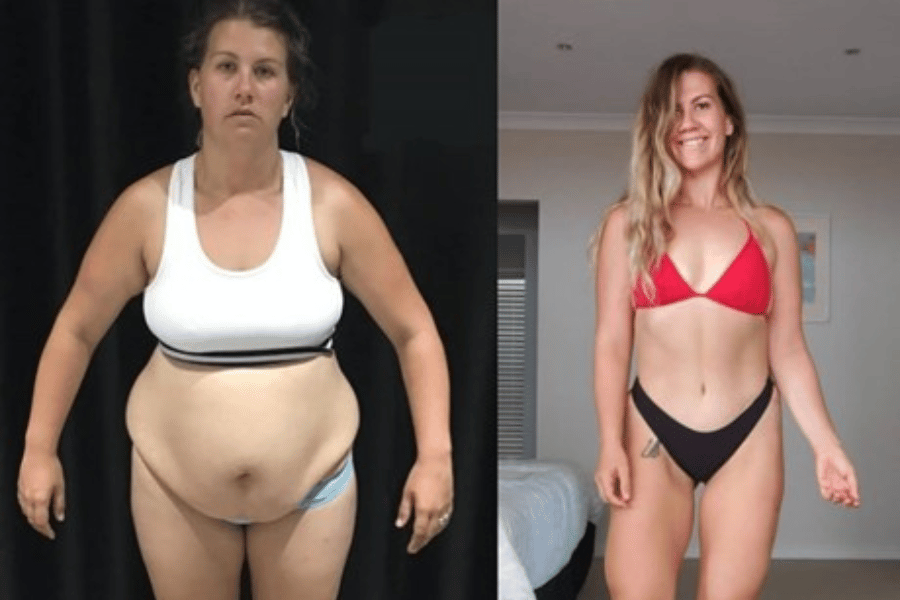Embarking on a journey to lose weight fast, especially with a goal like shedding 10 kg in just 2 weeks, is an ambitious endeavor. It’s crucial to approach this challenge with a strategy that prioritizes safety and sustainability. Rapid weight loss can be enticing, but it’s essential to understand the methods and implications thoroughly.
This guide aims to provide a comprehensive overview of effective and safe techniques for rapid weight loss. We will delve into various aspects, including realistic goal setting, diet and exercise plans, hydration, supplements, and the importance of sleep and stress management. Additionally, we’ll address the potential risks and how to manage them.
Renowned nutritionist Dr. Angela Martin emphasizes, “While rapid weight loss can be achieved, it’s imperative to approach it in a healthy way that respects your body’s limits.” This guide is crafted to help you navigate the complexities of losing weight quickly and responsibly.

how to lose weight fast in 2 weeks 10 kg

how to lose weight fast in 2 weeks 10 kg
Healthy Eating for Rapid Weight Loss
Achieving a goal like losing weight fast within 2 weeks requires a focused approach to diet. Creating a calorie deficit is essential, but it must be done healthily and sustainably.
- Creating a Calorie Deficit: To lose weight, you need to consume fewer calories than you burn. However, the deficit should be reasonable to avoid extreme calorie restrictions that can harm your health. Dietitian Emily Roberts suggests, “A moderate calorie deficit, combined with exercise, is more sustainable and healthier in the long term.”
- High-Protein and Low-Carb Meal Plans: A diet rich in protein can help preserve muscle mass while losing weight. Incorporate lean meats, fish, beans, and legumes. Reducing carbohydrate intake, especially refined carbs, can also aid in quicker weight loss. Focus on high-fiber, whole-grain options.
- Portion Control and Mindful Eating: Being mindful of portion sizes helps prevent overeating. Eating slowly and without distractions can increase feelings of fullness and improve digestion.
- Avoiding Crash Diets and Extreme Calorie Restrictions: Extremely low-calorie diets can lead to rapid weight loss, but they are often unsustainable and can be detrimental to your health. Nutritionist Dr. Lisa Young warns, “Crash diets can lead to nutrient deficiencies, decreased energy, and a higher risk of developing eating disorders.”
By focusing on a balanced diet that creates a safe calorie deficit, prioritizing protein, and avoiding unhealthy dieting tactics, you can approach your rapid weight loss goal more safely and effectively. Remember, the quality of the food you eat is just as important as the quantity when it comes to healthy weight loss.
Effective Exercise Strategies
In addition to a well-planned diet, effective exercise strategies are essential for rapid weight loss, particularly when aiming to lose weight fast in a short time frame like 2 weeks. Here’s how to optimize your workouts for this goal:
- Combining Cardio and Strength Training: A mix of cardiovascular exercises and strength training is key. Cardio burns calories and improves heart health, while strength training builds muscle, which can increase your metabolic rate. Fitness coach Mike Johnson recommends, “For rapid weight loss, combine high-intensity cardio with strength exercises that target all major muscle groups.”
- High-Intensity Interval Training (HIIT): HIIT involves short bursts of intense exercise followed by brief recovery periods. This type of training is highly effective for burning fat and can be more efficient than traditional steady-state cardio. “HIIT can elevate your metabolism for hours after the workout, leading to more calories burned,” notes personal trainer Sarah Lee.
- Creating a Workout Schedule: Plan your workouts to align with your weight loss goals. Aim for at least 150 minutes of moderate aerobic activity or 75 minutes of vigorous activity per week, along with strength training exercises at least twice a week, as recommended by health guidelines.
While exercising is crucial in achieving rapid weight loss, it’s equally important to listen to your body and avoid overtraining. Ensure that your exercise routine is balanced and sustainable, and consider seeking advice from a fitness professional to tailor a plan that suits your individual needs and goals.
Hydration and Supplements
Proper hydration and the judicious use of supplements can play significant roles in supporting rapid weight loss efforts, like striving to lose weight fast within 2 weeks.
- The Role of Proper Hydration:
- Hydration is crucial for overall health and can significantly impact weight loss. Water helps to keep the body’s metabolism functioning optimally and aids in digestion and nutrient absorption.
- Drinking water before meals can also lead to reduced calorie intake as it promotes a feeling of fullness.
- Nutritionist Lisa Johnson advises, “Adequate water intake is essential for flushing out toxins and can help prevent mistaking thirst for hunger.”
- Recommended Supplements for Enhanced Fat Loss:
- Certain supplements might aid in weight loss, such as green tea extract, caffeine, and omega-3 fatty acids. They can increase metabolism and enhance fat burning.
- Protein supplements can be helpful in maintaining muscle mass, especially important during rapid weight loss.
- It’s important to note that supplements should not replace whole foods. Dr. Mark Hyman emphasizes, “Supplements are to add to a healthy diet, not substitute it. Always prioritize nutrient-rich foods for weight loss and overall health.”
- Consulting a Healthcare Professional:
- Before starting any supplement regime, it’s crucial to consult with a healthcare professional, especially if you have underlying health conditions or are taking medication.
- This step ensures that the supplements will not adversely interact with your health status or any medications you are taking.
while hydration and supplements can be beneficial in aiding rapid weight loss, they should be used wisely and as part of a balanced approach to diet and exercise. Consulting with healthcare professionals ensures that your approach to weight loss is safe and tailored to your individual needs.

how to lose weight fast in 2 weeks 10 kg
Monitoring Progress and Adjustments
To achieve rapid weight loss, such as losing 10 kg in 2 weeks, it’s crucial to monitor your progress and make necessary adjustments to your plan. This ensures that you’re on track and can respond effectively to any changes in your body or lifestyle.
- Tracking Your Weight Loss Journey:
- Keep a journal or use an app to track your dietary intake, exercise, sleep patterns, and stress levels. This data can help you understand what’s working and what isn’t.
- Weigh yourself regularly, but remember that weight can fluctuate due to factors like water retention or muscle gain. Focus on overall trends rather than daily numbers.
- Recognizing and Celebrating Small Milestones:
- Celebrate small achievements, such as sticking to your diet plan for a week or improving your exercise capacity. This keeps motivation high.
- Fitness expert Alex Green suggests, “Setting and celebrating small, achievable goals can boost your confidence and commitment to the overall weight loss journey.”
- Making Necessary Adjustments to Your Plan:
- If you’re not seeing the expected results, reassess and adjust your diet and exercise plan. Maybe you need to tweak your calorie intake or intensify your workouts.
- Remember, the body adapts over time, so what worked at the beginning might need adjustment as you progress.
- Being Flexible and Adaptable:
- Flexibility in your approach is key. If a certain diet or workout isn’t suitable, be willing to try different strategies.
- Adapt your plan to fit into your lifestyle while still aiming for your goal. This ensures long-term sustainability beyond the initial 2-week period.
Monitoring your progress, celebrating small wins, and being adaptable with your plans are essential aspects of a successful rapid weight loss journey. These practices not only help in achieving your short-term goal but also lay the foundation for sustainable, long-term health and wellness.
Safety and Health Considerations
While the goal of losing weight fast in a short period, such as 10 kg in 2 weeks, can be appealing, it’s imperative to consider the safety and health implications of such rapid weight loss.
- Potential Risks and Side Effects:
- Rapid weight loss can lead to various health issues, including nutrient deficiencies, muscle loss, and gallstones. It can also impact mental health, leading to stress and an unhealthy relationship with food.
- Dr. Laura Adams, a medical expert, warns, “Rapid weight loss can sometimes result in serious health complications, especially if not done under professional supervision.”
- Importance of Consulting with a Healthcare Provider:
- Before starting any weight loss program, especially one that involves rapid weight loss, it’s crucial to consult with a healthcare provider. They can assess your overall health and advise on the safest and most effective approach.
- This is particularly important for individuals with pre-existing health conditions like diabetes, heart disease, or hypertension.
- Maintaining a Focus on Overall Health and Well-being:
- It’s important to prioritize overall health over rapid weight loss. Sustainable, gradual weight loss is generally safer and more effective in the long term.
- Consider incorporating habits that contribute to overall well-being, such as balanced nutrition, regular exercise, adequate sleep, and stress management.
- Long-term Health Implications:
- Rapid weight loss can sometimes lead to a cycle of yo-yo dieting, which has been associated with negative long-term health outcomes. Sustainable lifestyle changes are key to long-term success.
- Nutritionist Emily Parker emphasizes, “The focus should always be on developing healthy habits that you can maintain in the long term, rather than quick fixes.”
while rapid weight loss can be achieved, it’s important to approach it in a way that prioritizes your safety and long-term health. Consulting healthcare professionals and focusing on sustainable lifestyle changes are critical steps in this journey.
Frequently Asked Questions (FAQ)
In this section, we address some common queries related to the topic of rapid weight loss, particularly focusing on the goal of losing 10 kg in 2 weeks.
- Is it possible to lose 10 kg in 2 weeks safely?
- While losing 10 kg in 2 weeks is theoretically possible, it’s generally not considered safe or sustainable. Health professionals typically recommend a gradual weight loss of about 0.5 to 1 kg per week. Rapid weight loss can lead to health risks and is often not sustainable in the long term.
- What are the common mistakes to avoid during rapid weight loss?
- Common mistakes include extreme calorie restriction, neglecting nutrient balance, over-exercising, and not consulting with healthcare professionals. Such practices can lead to health complications and are generally unsustainable.
- Are there any specific foods that can boost weight loss?
- While no specific food can cause drastic weight loss, incorporating foods high in protein and fiber, such as lean meats, fish, legumes, vegetables, and whole grains, can help. These foods are more satiating and can aid in weight management.
- Can I maintain my weight loss after the 2-week period?
- Maintaining weight loss requires long-term lifestyle changes. This includes continuing a balanced diet, regular exercise, and other healthy habits. Rapid weight loss often results in regaining weight if these lifestyle changes are not implemented.
- What are some long-term strategies for maintaining a healthy weight?
- Long-term strategies include adopting a balanced diet, engaging in regular physical activity, monitoring your weight, managing stress, and ensuring adequate sleep. Consistency in these habits is key to maintaining a healthy weight.